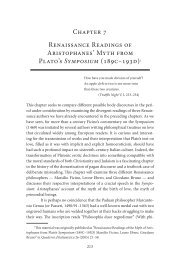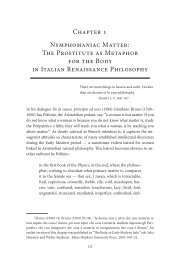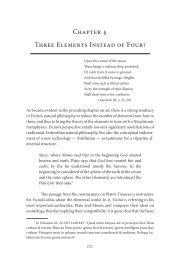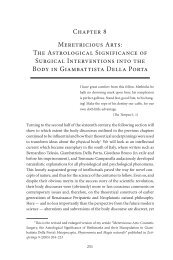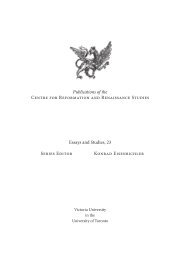Chapter 2 Matter as a Mirror: Marsilio Ficino and Renaissance ...
Chapter 2 Matter as a Mirror: Marsilio Ficino and Renaissance ...
Chapter 2 Matter as a Mirror: Marsilio Ficino and Renaissance ...
Create successful ePaper yourself
Turn your PDF publications into a flip-book with our unique Google optimized e-Paper software.
<strong>Matter</strong> <strong>as</strong> a <strong>Mirror</strong> 67<br />
<strong>and</strong> sank down into the stream <strong>and</strong> disappeared) then this<br />
man who clings to beautiful bodies <strong>and</strong> will not let them go,<br />
will, like the man in the story, but in soul, not in body, sink<br />
down into the dark depths where intellect h<strong>as</strong> no delight,<br />
<strong>and</strong> stay blind in Hades, consorting with shadows there <strong>and</strong><br />
here. 66<br />
The original meaning of the Ovidian myth is thus significantly altered.<br />
Plotinus remodels the story of Narcissus into an allegory of the worldly<br />
temptations of the soul that distract it from its proper goal, contemplation of<br />
the eternal forms. Narcissus’ fate is sealed by his mistaken dedication to the<br />
embodied <strong>and</strong> treacherous world of corporeal beings, shadows of the higher<br />
truths. His transgression consists in ignoring or forgetting the origin of the<br />
reflection in the water, namely that the soul is the cause of the physical shadow.<br />
67 According to Plotinus, it w<strong>as</strong> Narcissus’ own fault, not his punishment<br />
that led to his drowning in the pond. His fate thus becomes an allegory for<br />
the soul which ce<strong>as</strong>es to contemplate the hierarchy of being <strong>and</strong> falls in love<br />
with the b<strong>as</strong>e images of its own making. 68 In a movement that is central to his<br />
philosophy, Plotinus eclipses the idea that the descent of soul into the corporeal<br />
world is a creative <strong>and</strong> positive act (<strong>as</strong> opposed to a dramatic event).<br />
Ironically, by using the story of Narcissus to illustrate the descent of soul into<br />
the world, Plotinus opens the door for an entirely different underst<strong>and</strong>ing of<br />
the myth: by gazing at the reflecting surface, Narcissus imprints his form onto<br />
matter <strong>and</strong> hence shapes or even creates the physical world. The Plotinian<br />
version of the Narcissus story certainly appealed to <strong>Ficino</strong> for its moralising<br />
content, but yet he inserted it into a different context. Where<strong>as</strong> Plotinus had<br />
<strong>as</strong>sumed that soul <strong>and</strong> body never enter into a unity, matter being a mere<br />
66 Trans. Plotinus (1966–1988) I: 257; Enneads, I, 6, 8.<br />
67 Plotinus, Enneads, V, 8, 2. See Hadot (1976) 99: “Si Narcisse entent pour une réalité<br />
substantielle ce qui n’est qu’un reflet, c’est qu’il ignore la relation entre ce reflet et lui-même.<br />
Il ne comprend p<strong>as</strong> qu’il est lui-même la cause de ce ombre.”<br />
68 Plotinus, Enneads, I, 6, 8; Hadot (1976) 107 comments: “Narcisse se laisse hypnotiser<br />
par une réalité partielle et imparfaite au lieu de déployer son regard vers le v<strong>as</strong>te horizon<br />
du tout. Pour Plotin, aussi Narcisse est un contempteur d’Eros, ou plus exactement il<br />
se laisse f<strong>as</strong>ciner par la magie de l’Eros inférieur.” See Enneads IV, 4, 40; Frontisi-Ducroux<br />
(1997) 222–224: “L’âme est coupable de restreindre sa vision elle-même en oubliant qu’elle<br />
n’est que parcelle et reflet de la totalité divine.”



